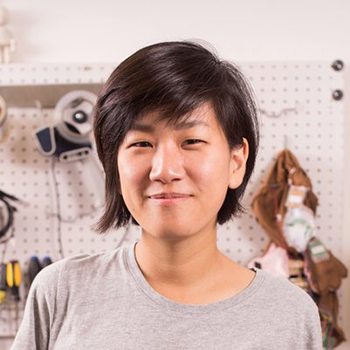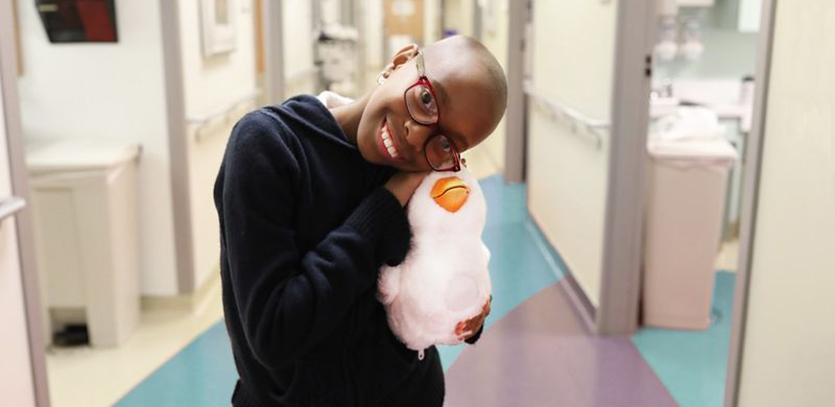Alumna's Company Wins Award at 2018 Consumer Electronics Show
Sproutel designed robotic companion for children who have cancers
Northwestern Engineering alumna Hannah Chung’s company Sproutel won the Tech for a Better World Innovation Award at the 2018 Consumer Electronics Show in January. The prestigious award recognizes My Special Aflac Duck, a smart robotic companion for children who have cancers. Sproutel developed the companion in partnership with the insurance company for its Aflac Childhood Cancer Campaign.
 Chung is the co-founder and chief creative officer of Sproutel, a research and development workshop focused on innovation in the healthcare industry. Chung started the company in 2011 while still a Northwestern student with her classmate Aaron Horowitz.
Chung is the co-founder and chief creative officer of Sproutel, a research and development workshop focused on innovation in the healthcare industry. Chung started the company in 2011 while still a Northwestern student with her classmate Aaron Horowitz.
The collaboration with Aflac was a perfect fit for her company.
"We are really excited about this project," says Chung. "At Sproutel, we create products that empower patients and help them in meaningful ways. Aflac has donated more than 120 million dollars to this cause [through the Aflac Childhood Cancer Campaign] and they wanted to find a way to help more kids in a tangible way. So, we started working together to create a comforting companion for children with cancer."
Journey to Feasibility
With four patents pending, My Special Aflac Duck features interactive technology and a web-based app that enables children to mimic their care routines through augmented reality. The duck also helps distract children by dancing, quacking, and nuzzling.
"As you can imagine, the cancer treatment journey for a child is difficult. Kids lose control when they go through this really long process," said Chung. "Depending on the type of cancer the child has, it can mean a really long stay at the hospital. Research says that kids want that control back, so we thought a lot about that."
Sproutel conducted patient-centered design process for a year to develop My Special Aflac Duck.
"We went to the Aflac Cancer and Blood Disorders Center of Children's Healthcare of Atlanta every other month for about a year," said Chung. "We interviewed and tested with one hundred children and parents throughout the process."
In early 2018, Aflac and Sproutel will begin delivering the My Special Aflac Duck to children at the Aflac Cancer and Blood Disorders Center for further feasibility testing.
"The reason why this testing is so important is that we want to show impact," explains Chung. "You can collect anecdotes from parents, but we want the impact to be proven in research. So, continuously testing each component is an important milestone for us to reach before we distribute the product."
The smart companion is expected to be available to children with cancer nationwide by early 2019.
Discovering a passion for design
When Chung arrived at Northwestern, she knew she wanted to make a difference in healthcare. Initially, she planned to study biomedical engineering. Chung's father had been diagnosed with type 2 diabetes, and she had seen how a support system helped him adjust to his new lifestyle.
"I learned that managing a chronic condition can be very lonely, but it can be very empowering if you can build a community around it. From that experience on, I was always interested in healthcare," says Chung.
During her first year of college, Chung attended a seminar hosted by the Segal Design Institute called DESIGN: Chicago. There, she heard Walter Herbst, director of Northwestern Engineering's Master of Product Design and Development Management program, speak about the role of design thinking in industry.
Chung introduced herself to Herbst and explained that she wanted to learn about design. Herbst took the first-year student on as a mentee and taught her industrial design sketching once a week over coffee.
Around the same time, Chung attended a meeting organized by Liz Gerber, the Breed Junior Chair of Design at Northwestern, to explore how the design process could be used for social good.
“That turned out to be the first meeting for Design for America,” says Chung.
Chung went on to help found Design for America (DFA), an organization housed within the Segal Design Institute at Northwestern Engineering that trains college students in social innovation. Today, DFA is a national network with chapters on 36 campuses.
Advice for Wildcats
When asked what advice she would give to current undergraduates at Northwestern, Chung encouraged students to find a mentor.
"If there’s a professor that you like, reach out to them and be ready talk about your goals. You can start this as early as freshman year," says Chung. "And remember that mentors extend beyond college years. These people invested in you personally and are interested in your long-term growth."
Chung also encouraged Wildcats to keep an open mind.
"Many times, people come into undergrad with a very narrow outlook. Those things can change," says Chung. "Try different things. Explore. Holding yourself to one thing can limit you."

